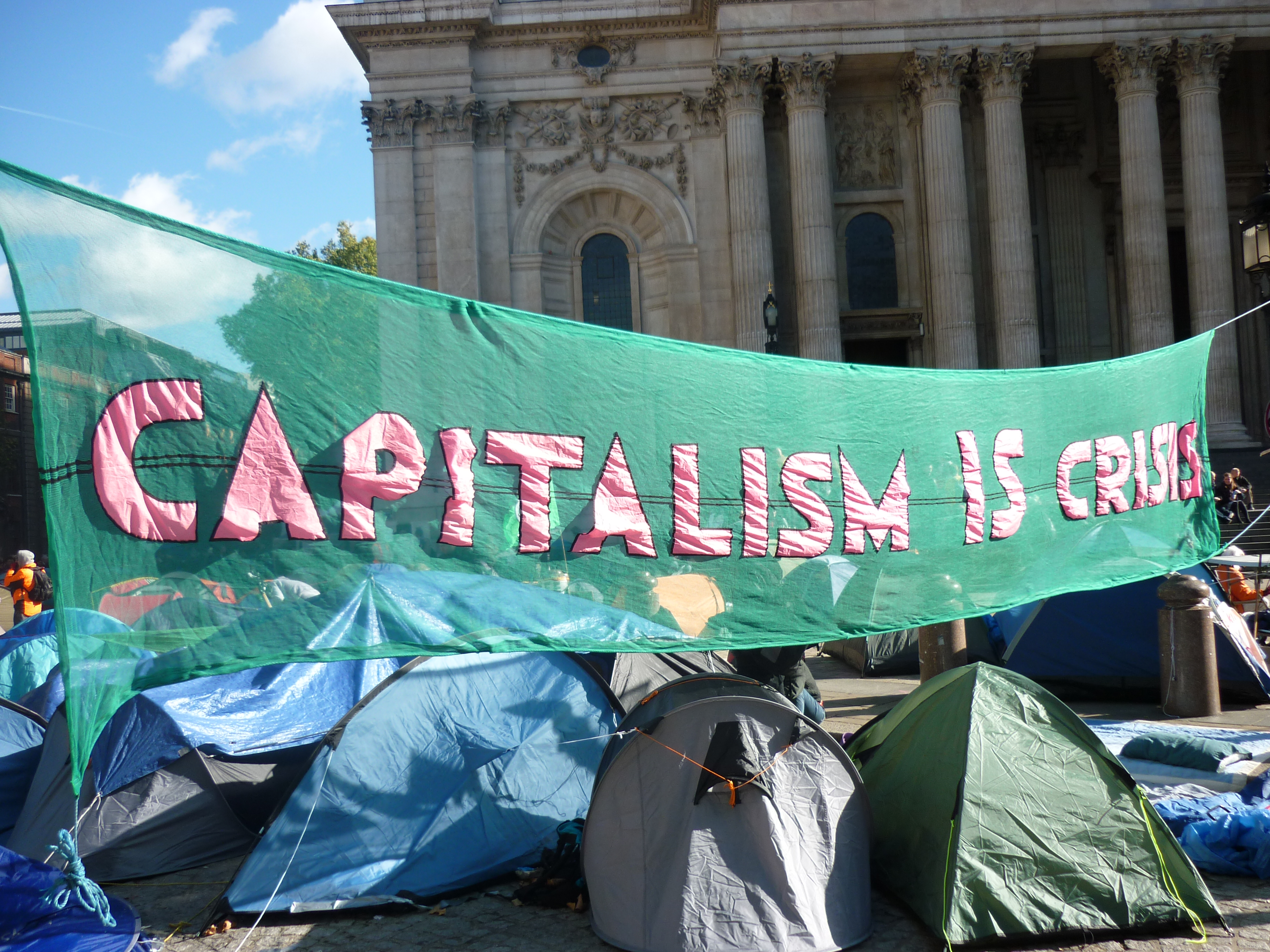We live in a world of crisis, climate change, poverty and war, says Feiyi Zhang, which is why we must fight to replace it with a new society of freedom and democracy, socialism
We are now in the fifth year of a global economic crisis that has seen millions of people lose their jobs and end up in poverty. In response to the bankruptcy of our system a wave of revolt has spread across the world. From the Arab Spring to Occupy and general strikes in Greece, ordinary people have demonstrated the possibility of a different society.
The crisis, the deepest since the Great Depression in the 1930s, is a result of capitalism’s blind pursuit of profit. It was sparked by the sub-prime mortgage crisis in the US, where people were given mortgages they could not afford so that speculators could make money on the financial markets. This created a housing bubble that burst when people started defaulting on their loans. In total 1.5 million people in America have lost their homes since the crisis began.
Capitalism is failing to meet people’s basic needs. In the US, the world’s richest country, 47.7 million people are forced to live off food stamps and 4.8 million people are long-term unemployed.

In Greece and Spain over 25 per cent of the population is unemployed and almost half of all young people are without work. In Greece wages in the private sector have declined more than 30 per cent since 2010 and minimum monthly wages have fallen 22 per cent. The suicide rate has risen by a third since the crisis began.
Rather than addressing unemployment, governments have spent billions bailing out the very banks that caused the crisis. Now workers and the poor are being forced to pay for this through austerity programs, spending cuts to public schools, and mass sackings of public sector workers.
Greek socialist Nikos Loudos has described the impact of austerity, “There are hospitals that virtually cannot work now due to cuts. There are university faculties that have shut down because they cannot work—this happened in the architecture faculty in Athens. There are instances in hospitals where doctors and staff asked people to bring medicine and equipment from their homes”.
Our rulers’ efforts to force ordinary people to pay for the crisis show how society is run in the interests of the super-rich 1 per cent, and the lack of any democratic control by the majority.
Despite the crisis the rich have held onto their control of the world’s wealth—and many of them have gotten wealthier through the crisis. The richest 1 per cent of people in the world own as much as the bottom 57 per cent. The Institute for Policy Studies found that CEOs at large US firms earned, on average, $10.8 million in 2010, a 28 per cent increase from the year before.
What is the alternative?
The recent wave of revolt across the world has revived the belief that ordinary people have the power to change society. Prior to the Arab Spring, mainstream governments and media pushed the racist idea that the Arab world was backward and disinterested in democracy. The ordinary people who toppled the dictator Ben Ali in Tunisia provided a confidence to change society which sparked a wildfire of struggle across the Arab world. It also inspired the “Occupy” movement and the Indignados movement in Spain that occupied city squares and workplaces against austerity and the priorities of capitalism.
These movements have not overturned the system. In Egypt a revolution removed the dictator Hosni Mubarak but placed another ruler at the top of society. The economic basis of the capitalist system has remained in place. Approximately 40 per cent of Egyptians live on $2 a day. Youth unemployment remains around 25 per cent in a country where 60 per cent of the population are under 25.
The struggles need to go further, and develop into forms of workers’ power. In the week leading up to Mubarak’s overthrow it was the wave of strikes across Egypt that paralysed the country’s economy and put the knife into Mubarak’s rule.
The power of workers stems from the central role they play in generating the very basis of capitalism—profit. Without workers, nothing would run in our society, from a bus to a cafe, school, factory or hospital. This means workers have immense power when acting together. Strikes can shut down whole economies.
The working class can also be a democratic class and has the ability to introduce a new way of running society. Workers can’t run workplaces alone and in strikes have to decide together how the workplace is going to function.
An alternative way of running society has been glimpsed numerous times this century during high points in struggle. The last global wave of radicalisation occurred in the late 1960s and 1970s. In 1968 student struggles across the world challenged the American war against Vietnam through walk-outs, sit-ins and mass-discussions. In Paris students took over their universities declaring “people’s universities”. French workers then called a general strike to join the students, involving at one point two-thirds of the workforce.
Some of these mass movements created revolutionary situations where people started taking over factories and workplaces and running them themselves, such as Germany after the First World War, Spain in 1936-39, Hungary in 1956, France in 1968 and Iran in 1979. There have even been small glimpses of this recently in Greece with workers briefly taking control over running a newspaper and a hospital in Kilkis. This process leads workers to begin democratically deciding not just how to manage the workplace but what should be produced and whether it fulfils social and community needs.
One example of how this develops is Chile, where there was a revolutionary period from 1970-73 where workers were seizing factories and peasants were seizing land. The most radicalised workers formed the “Cordones Industriales”—coordinating committees which linked together different workplaces. The elected Allende government began nationalising industries in a challenge to the profits of bosses. A movement that began by defending the Allende government was forced to take over more and more of the running of society itself.
The bosses launched a “strike” offensive to bring down the Allende Government by economic strangulation. Mario Nain, a participant in the Chilean revolution recounts, “We organised a general assembly in my neighbourhood and formed a committee to expropriate the food from the supermarkets. We also formed a committee of self defence and a committee for education and health. Workers seized lorries, broke into supermarkets closed by the bosses, and threw out factory owners who tried to stop production. They took over factories and other enterprises, seized their assets and ran them on the principle of collective workers’ democracy.”
This shows the ability of workers to take control of economic as well as political power out of the hands of the 1 per cent and into those of the majority.
The most advanced form of workers power occurred for a short period during the Russian Revolution of 1917. In October workers took over their own workplaces and delegates were elected from each workplace to national congresses to decide how run society. An immense wave of reforms were put into place which still haven’t been won, or have only recently been won, in many countries today, such as the legalisation of homosexuality, gender equality, divorce and abortion.
Revolution today
A revolution is necessary to introduce such a socialist system that immediately addresses the problems capitalism cannot solve. There is no reason why we cannot provide for the needs of all people in society.
Capitalism cannot meet everyone’s most basic needs of food, housing and jobs. One in six of the world’s population, or one billion people, do not get enough to eat, according to the United Nations. Yet half of the world’s food goes to waste, a recent study by the UK-based Institution of Mechanical Engineers found.
Unlike the so-called “socialist” regimes under Stalin in Russia or Mao in China, there would be democratic decision making rather than all decisions being in the hands of a central bureaucracy. There would be democratic planning where local areas and committees fed in information about requirements for things like housing, childcare and food into national and international systems of planning.
Climate change is the biggest issue facing humanity and the future of our planet. The solution through large-scale use of renewable energy is available. Spain has demonstrated the viability of solar energy, already running on 32 per cent renewable energy in 2012 and planning to increase this to 40 per cent by 2020. But because decisions about production under capitalism are based on maximising the profits of corporations like mega mining and minerals companies, governments are unable to act. Under a socialist society we could tackle social problems in a rational manner, immediately transitioning to renewals through large-scale building of solar and wind plants. In the process we would also create millions of green jobs.
The history of revolution and the recent wave of revolts demonstrates the power of ordinary people to not only change society but the power of workers to transform it in the interests of the majority. Even smaller struggles wherever they occur such as against job losses, public sector cuts and the slashing of education on campuses are a bridge towards the social transformation necessary. We have to throw ourselves into building these struggles now.





